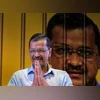)
New Delhi: In this May 22, 2024 file photo, Delhi Chief Minister Arvind Kejriwal during a meeting with lawyers, in New Delhi (Photo: PTI)
Ahead of the Haryana elections, Delhi Chief Minister Arvind Kejriwal was granted bail by the Supreme Court in the alleged Delhi liquor policy scam, but the bench remained ‘divided’ on the legality of his arrest by the Central Bureau of Investigation (CBI).
A division bench of Justices Surya Kant and Ujjal Bhuyan had reserved its verdict on September 5 and gave separate judgments.
Both the judges were unanimous in the decision to grant bail to Kejriwal, saying that the chargesheet has been filed in the case and that the trial is unlikely to be completed in the near future. They held that Kejriwal’s continued incarceration would infringe upon the right to personal liberty under Article 21.
“In our considered view, although the procedure for the Appellant’s arrest meets the requisite criteria for legality and compliance, continued incarceration for an extended period pending trial would infringe upon established legal principles and the Appellant’s right to liberty, traceable to Article 21 of our Constitution. The Appellant has been granted interim bail by this Court in the ED matter on May 10, 2024, and July 12, 2024, arising from the same set of facts. Additionally, several co-accused in both the CBI and ED matters have also been granted bail by the trial court, the high court, and this Court in separate proceedings,” the order said.
The judgment was on petitions filed by Kejriwal seeking bail and the quashing of his arrest by the CBI on June 26.
The bail conditions on Kejriwal are the same as those imposed by the coordinate bench while granting interim bail in the ED case, which means that the Delhi CM cannot visit the office of the Chief Minister and Delhi Secretariat and he cannot sign official files unless it is required and necessary for obtaining clearance/approval of the Lieutenant Governor of Delhi.
In his judgment, Justice Kant held that Kejriwal’s arrest was legal and did not suffer from any procedural irregularity and there was no merit in the contention that the CBI failed to comply with the provisions of the Code of Criminal Procedure while arresting him.
“We are thus of the view that the Appellant’s arrest does not suffer from any procedural infirmity. Consequently, the plea regarding non-compliance of these provisions merits rejection. Ordered accordingly,” he said.
‘Not a caged parrot’
Justice Bhuyan, meanwhile, had a differing view. He said the CBI’s arrest raises more questions than it seeks to answer.
Justice Bhuyan noted that the CBI did not arrest Kejriwal for 22 months and said he failed ‘to understand the great hurry and urgency on the part of the CBI to arrest the appellant (Kejriwal) when he was on the cusp of release in the ED (Enforcement Directorate) case.’
“Power to arrest is one thing, but the need to arrest is altogether a different thing. Just because an investigating agency has the power to arrest, it does not necessarily mean that it should arrest such a person,” he said.
Stressing the need to shed the image of the CBI as a ‘caged parrot’, he said, “Investigation must not only be fair but must be seen to be so. Every effort must be made to remove any perception that the investigation was not carried out fairly and that the arrest was made in a highhanded and biased manner,” he said.
He added that in a functional democracy governed by the rule of law, perception matters. “Like Caesar’s wife, an investigating agency must be above board. Not so long ago, this Court had castigated the CBI, comparing it to a caged parrot. It is imperative that CBI dispel the notion of it being a caged parrot. Rather, the perception should be that of an uncaged parrot,” he said.
He also said in his order that though he has serious reservations on bail conditions that stop Kejriwal from entering the office of the Chief Minister and the Delhi Secretariat as well as from signing files, he would refrain from further expressing his views thereon at this stage since those conditions have been imposed in the separate ED case by a two-judge bench of the Supreme Court.
Saying that the CBI is definitely wrong when it says that because the appellant (Kejriwal) was evasive in his reply, and because he was not cooperating with the investigation, he was rightly arrested and now should be continued in detention.
“It cannot be the proposition that only when an accused answers the questions put to him by the investigation agency in the manner in which the investigating agency would like the accused to answer, would it mean that the accused is cooperating with the investigation. Further, the respondent cannot justify arrest and continued detention citing evasive reply,” he said.
First Published: Sep 13 2024 | 7:37 PM IST





